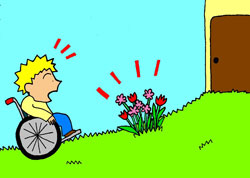
今週のよくある英語の間違い:
- barrier free/accessibility
- ramp/slope
- Count/No Count: Sport
- “A or U” answer (click here)
Co-hosts: Kei Oonuki and Yuki Sukehiro
ポッドキャスト: 新しいウインドウで再生 | ダウンロード
Subscribe: RSS
さぁ、変な英語を直しましょう!-

今週のよくある英語の間違い:
Co-hosts: Kei Oonuki and Yuki Sukehiro
ポッドキャスト: 新しいウインドウで再生 | ダウンロード
Subscribe: RSS

X No Smoking Flore
Tim says:
Oh, come on. Give me a break! This is an incredibly simple spelling mistake.
There’s really nothing to explain here, but what is noteworthy is where I saw this sign: Tokyo Big Sight! I would hope that a place that wants to be thought of as an international convention center would try a little harder to get its English signs right.
For that matter, the name “Tokyo Big Sight” is, itself, odd. Most native English speakers assume that it’s called “Tokyo Big Site” (site=場所) rather than “Big Sight” (「大きい見ること」? What does that mean?). It would help Tokyo, and Japan, a lot to take a little more care to make more foreigner-friendly signs.
O No Smoking Floor
Ayumi says:
田中亜由美は「TOEICテスト クロストレーニング PART 1・2」などの本は販売中!ブログはこちら.
周囲にある英語を見て、果たしてそれが正しい英語なのだろうかと感じる英語はありますか?「あの英語は絶対に間違っている」という英語の表記はありますか?看板の写真を撮って、Machigai.comに送りましょう!とんでもない英語だったら、このコーナーで出します!
さっき、銀座通り通った。そこはもう込んでいる。
次のクイズは1月14日(水)です。
This site will always respect your personal information.
Entering your e-mail address will allow this form to send a copy of your answer back to you.
このコーナーは毎週水曜日です!
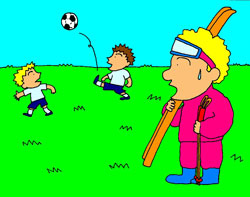
今週のよくある英語の間違い:
Co-hosts: Kei Oonuki and Yuki Sukehiro
ポッドキャスト: 新しいウインドウで再生 | ダウンロード
Subscribe: RSS
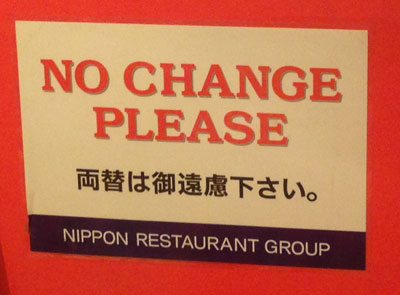
X No Change Please
Tim says:
This sign was intended to mean that you can not receive change from this cashier. But it sounds as if the restaurant does not want to receive change from you!
The Japanese translation uses the term 両替. We can assume that the intended meaning is お金をくずす (“make change”) and not, for example, changing yen to dollars.
But “change” is being used as a noun here (rather than the verb “make change” or “give change”), and as a noun it should mean 「小銭」, or 「おつり」, or even 「変革」! So “No change please” translates as「小銭を私たちに与えないでください」! (Native speakers will NOT think that “No change please” means “Please don’t ask us to make change.”)
Technically, 「両替は御遠慮下さい」 means “Please refrain from asking us to make change”, which is a natural way of expressing this in Japanese, but sounds strange in English. We expect a sign like this to tell us directly what THEY will not do, rather than asking US to avoid doing something.
It’s still possible to do this in a way that sounds polite, though:
O Sorry, we cannot give change
周囲にある英語を見て、果たしてそれが正しい英語なのだろうかと感じる英語はありますか?「あの英語は絶対に間違っている」という英語の表記はありますか?看板の写真を撮って、Machigai.comに送りましょう!とんでもない英語だったら、このコーナーで出します!
彼はバイクに乗っているけど、
彼女はリムジンに乗っている。
次のクイズは1月7日(水)です。
This site will always respect your personal information.
Entering your e-mail address will allow this form to send a copy of your answer back to you.
このコーナーは毎週水曜日です!
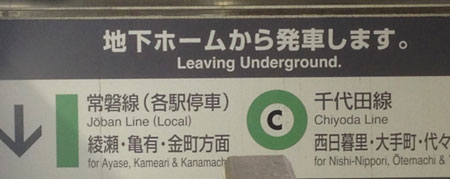
X Leaving Underground.
Tim says:
Something about this sign made me worry that I was going to miss the train. It’s leaving already?!
It would sound a little better to say “leaving from underground” or “departing from underground”. But most native English speakers (perhaps Americans in particular!) prefer to have the intended meaning stated more clearly. The point of this sign is not that the train is leaving, nor even that it’s underground; it’s that the track is below where you currently are, and that you need to go down in order to board the train. So how about:
O Go downstairs to board the train
Ayumi says:
修正案としては、1) 主語を補い、2) 動詞の形を変えて、3) underground に fromをつける。
The trains leave from underground.
ところで、日本語で「地下ホームから発車します。」と言われたら、「地下ホームに降りてください。」の意味だとわかる。「降りてください」と直接言うのではなく、間接的な表現を使うのが日本語の特徴でもあり自然なのですが、英語では違う。まどろっこしい言い方では、beside the point (的外れ) でわかりにくいと判断されてしまいます。たとえ正しい英語でも、単なる日本語の英訳だと英語としてピントがはずれてしまうこともありますね。
気をつけねば~
田中亜由美は「TOEICテスト クロストレーニング PART 1・2」などの本は販売中!ブログはこちら.
周囲にある英語を見て、果たしてそれが正しい英語なのだろうかと感じる英語はありますか?「あの英語は絶対に間違っている」という英語の表記はありますか?看板の写真を撮って、Machigai.comに送りましょう!とんでもない英語だったら、このコーナーで出します!
そのサイトでフォローしてくれたから、リフォローしてあげた。
次のクイズは12月31日(水)です。
This site will always respect your personal information.
Entering your e-mail address will allow this form to send a copy of your answer back to you.
このコーナーは毎週水曜日です!
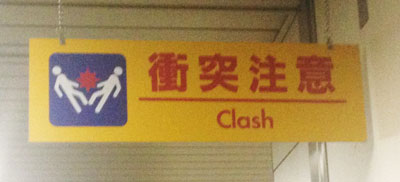
X Clash
Tim says:
I have a few theories about this very strange sign:
「衝突」in English is “collision”, not “clash”. However, “beware of collisions” is a little unclear. Perhaps we could say:
O Be careful when rounding corner
Ayumi says:
田中亜由美は「TOEICテスト クロストレーニング PART 1・2」などの本は販売中!ブログはこちら.
周囲にある英語を見て、果たしてそれが正しい英語なのだろうかと感じる英語はありますか?「あの英語は絶対に間違っている」という英語の表記はありますか?看板の写真を撮って、Machigai.comに送りましょう!とんでもない英語だったら、このコーナーで出します!
その後からずっと風邪をひいている。
次のクイズは12月24日(水)です。
This site will always respect your personal information.
Entering your e-mail address will allow this form to send a copy of your answer back to you.
このコーナーは毎週水曜日です!